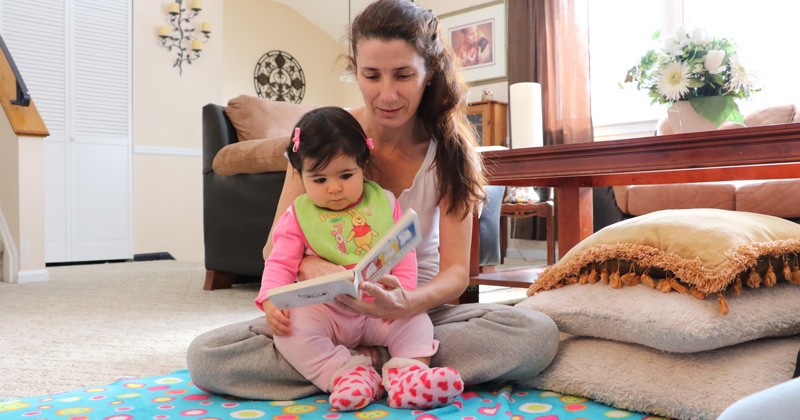CEHD Research Spotlight: Stephanie Del Tufo and Ye Shen

How does parent-child reading affect the developing reading skills of bilingual children who speak a language other than English at home?
In a recent study, University of Delaware education doctoral candidate Ye Shen and assistant professor Stephanie Del Tufo examined the effect of parent-child reading on the emergent literacy—or developing reading skills—of heritage language learners (bilingual children who speak a language other than English at home but receive instruction in English at school). Using a nationally representative sample of 965 heritage language learners between the ages of 2 and 6, they found that parent-child shared book reading positively contributed to heritage language learners’ emergent, or developing, literacy. The study offers two novel contributions in relation to the children’s developing literacy and their families’ socioeconomic status (SES): First, the amount of shared reading partially explains the finding that heritage language learners from higher SES families have stronger literacy skills. Importantly, the benefit of shared reading was evident regardless of SES background. Second, this study is the first to document this relationship among a sample of learners from a diverse set of home language backgrounds.
“If we have only learned one thing in the last 100 years of literacy research, it is that reading to children promotes children’s literacy. Here, we show that this is not only the case for monolingual children, but also heritage language learners—the largest growing population of bilingual children in the United States,” said Del Tufo. “Over 23% of the United States school population includes children who primarily speak a language other than English at home. It is imperative that we, as educators, know how to support their early literacy development.”
Specifically, Shen and Del Tufo found that parent-child shared book reading mediated the relationship between the family’s SES and the child’s developing literacy. In other words, parent-child shared book reading can explain, in part, the relationship between SES and heritage language learners’ early literacy ability. Families with higher SES were more likely to engage in parent-child shared book reading, which is associated with better literacy development among heritage language learners. The mediating effect of parent-child shared book reading on the relationship between SES and the children’s developing literacy was stronger for younger children (ages 2-4 years) than older children (ages 4-6 years).
In “Parent-child shared book reading mediates the impact of socioeconomic status on heritage language learners’ emergent literacy,” Shen and Del Tufo offer two important contributions to the field of literacy and language development among multilingual children. First, while previous studies mostly focused on heritage language learners from a specific heritage language background, such as Spanish, this study is the first to investigate the relationship between shared book reading and emergent literacy in a nationally representative sample of learners from diverse home language backgrounds, including Spanish, French, Chinese and other languages. Second, this study is the first to document the relationship between SES and heritage language learners’ parent-child shared book reading—that is, the reading advantage of heritage language learners from higher SES families is due in part to more shared book reading. Other research has shown that monolingual socioeconomically disadvantaged children benefit as much, if not more, from parent-child shared book reading than children growing up in middle and high SES families. This study begins to illustrate these advantages for heritage language learners.
Shen and Del Tufo’s findings have important implications for informal educational “at home” practices. First, for families with young children speaking a heritage language, this study encourages parents to read frequently to their children. Second, the benefit of parent-child shared book reading was evident regardless of socioeconomic background although heritage language learners from higher socioeconomic backgrounds tended to engage in book-reading more frequently. Shen and Del Tufo urge early childhood educators to develop and implement literacy programs that promote shared book reading practices at home, especially for children from low SES backgrounds.
This research was supported by an Arnsdorf Summer Research Fellowship and a UD Doctoral Fellowship, both awarded to Ye Shen.



